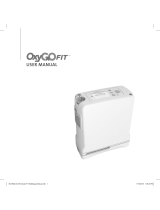
13
Operating Instructions Chapter 3
NOTE Under certain conditions (see Technical Specifications) the power
supply may shut down. The green LED will blink or will no longer be
illuminated. If this occurs, disconnect the power supply for at least 10
seconds and reconnect.
NOTE When the power supply is disconnected from the AC outlet,
also disconnect it from the concentrator to avoid unnecessary
battery discharge.
5. Connect the nasal cannula tubing to the nozzle fitting.
Nozzle fitting is located on the top of the Inogen One® G3.
Use of a single lumen cannula up to 25 feet in length is
recommended to ensure proper breath detection and oxygen
delivery. Additional titration may be needed to ensure proper
oxygen delivery when using a particular cannula.
CAUTION
To ensure oxygen flow, ensure that the nasal cannula is properly connected to
the nozzle fitting and that the tubing is not kinked or pinched in any way.
CAUTION
Replace the nasal cannula on a regular basis. Check with your equipment
provider or physician to determine how often the cannula should be replaced.
6. Turn on your Inogen One® G3 by pressing the ON/OFF Button.
A single short beep will sound after the Inogen logo is displayed.
“Please Wait” will appear while the concentrator starts up. The display
will indicate the selected flow setting and power condition. Following a
brief start-up sequence, a warm up period up to 2 minutes will initiate.
During this time period the oxygen concentration is building to but may
not have reached specification. Additional warm up time may be needed
if your Inogen One® G3 has been stored in extremely cold temperatures.
7. Set the Inogen One® G3 Concentrator to the flow rate prescribed by your
physician or clinician.
Use the + or – setting buttons to adjust the Inogen One® G3 to the desired setting.
The current setting can be viewed on the display.
English






















